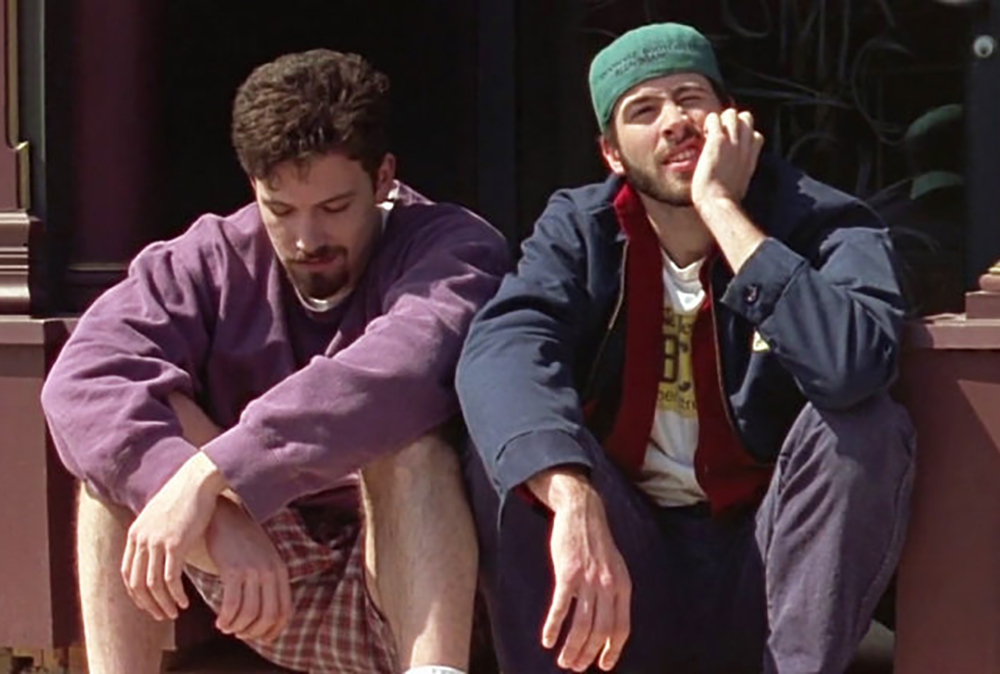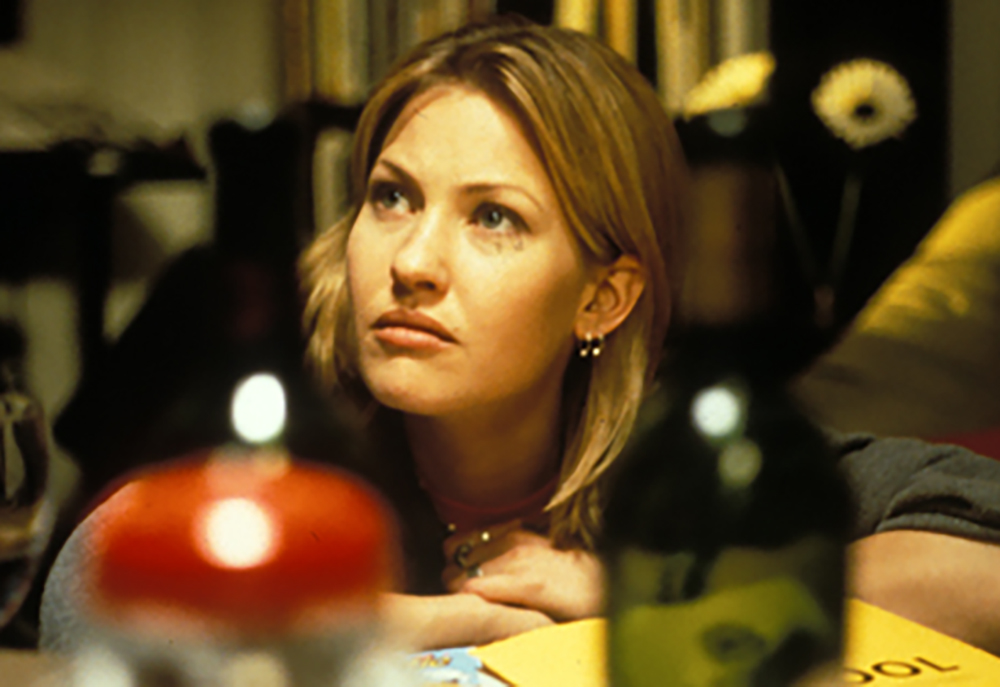From the man who directed “Clerks,” “Mallrats,” and “Jay and Silent Bob Strike Back,” “Chasing Amy” remains one of Kevin Smith’s deepest and best. Smith’s later films have such a way of including zany or larger than life material (“Jay and Silent Bob Strike Back” and “Dogma” the best examples of these), that we forget how personal and focused he can be when he wants to. “Chasing Amy” is an example of this, a focused look at three people—two of them swept up in an impossible love affair—and an exploration of the often unchangeable human condition.
Mixed with humor, the film gives us a look at a comic book creating duo played by Ben Affleck and Jason Lee. Affleck plays Holden and Lee plays Banky; and while Affleck would star in deeper films, such as the same year’s “Good Will Hunting,” “Amy” is probably Lee’s deepest role. The two have created a successful comic book called “Bluntman and Chronic,” and busy their lives penning new issues and doing the convention circuit.
They have a friendship with another comic book artist, ‘Hooper X’ (Dwight Ewell); it is through Hooper that Holden is introduced to the beautiful Alyssa Jones, played to perfection by Joey Lauren Adams of “Mallrats” fame. Holden falls quickly in love with Alyssa, despite the fact that she is gay. The movie takes pains to explain to us that Holden does love Alyssa, and she probably loves him. And the two do eventually get together in a sweet and real romance. But it’s not the fact that they get together, but what happens to their lives because they do, that makes this movie painful and real.
“Chasing Amy” is filled with the types of things that its viewers will relate to, especially those familiar with the pains of unrequited love. A good portion of the movie is filled with scenes of Holden and Alyssa hanging out as friends, and we see the uncomfortable way he feels both holding his feelings back and in accepting Alyssa’s gay lifestyle. At one point Banky accuses Holden of being too conservative for Alyssa (who has an extensive sexual history), and he’s right. This is no more evident as their romance progresses, and Holden feels increasingly inadequate as her partner.

Smith’s brilliance with this film is that he doesn’t show us the themes running through Holden, Alyssa, and Banky’s lives, but outright tells us. He lets our frustration run parallel to theirs as they live out damaging arcs we know are unhealthy, yet are powerless to stop. He winds us up was we watch Holden and know what is going through his head, even though we know he’s dead wrong. We see the way Banky feeds into Holden’s insecurities, escalating him, making him feel inadequate as his friend is happy for possibly the first time. And through this we see Alyssa, not the way Banky wants Holden to see her (as a damaged girl with a promiscuous past), but as Smith does; as a lovely woman who is everything that Holden needs if he can let his insecurities go.
The acting by all three is pleasing, though Lee and Adams own the most dynamic performances. Affleck is best when his emoting is kept to small snippets (as seen in his powerful speech to Matt Damon in “Good Will Hunting”) and here gets lost amidst the shuffle. But he’s likable, and we see his plight. Banky gets mad a lot in this film, and Lee gets to do what he does best as he shouts at people, usually Holden, the more dynamic as he mirrors our feelings towards Holden. We often want to shout at Holden for his actions, but can only sit helplessly and watch. This is never so evident than in the movie’s two key sequences—one, as Holden passive-aggressively badgers Alyssa on her past, and the film’s near close in a scene that involves Alyssa, Banky, and Holden that is painful, uncomfortable, and ironic. Holden’s not a victim, but wants to be, and Smith unflinchingly shines a camera on these events as they unfold.
Amidst this, Joey Lauren Adams is the most remarkable, and handles what is probably the toughest role with ease. She makes us believe all parts of her—first, that was a sexually experimental girl, and later that she’s moved past that and is just looking for love.
“Chasing Amy” is a good film, a film that is focused and realistic, possibly more so because it’s sad. While the nature of its characters’ emotions have been covered by more serious films (such David Gordon Green’s excellent “All the Real Girls”), by mixing comedy with over explanation, Smith makes the events sting that much more. Whether you’re a fan of Kevin Smith’s directing or not, here is a powerful film nonetheless.


